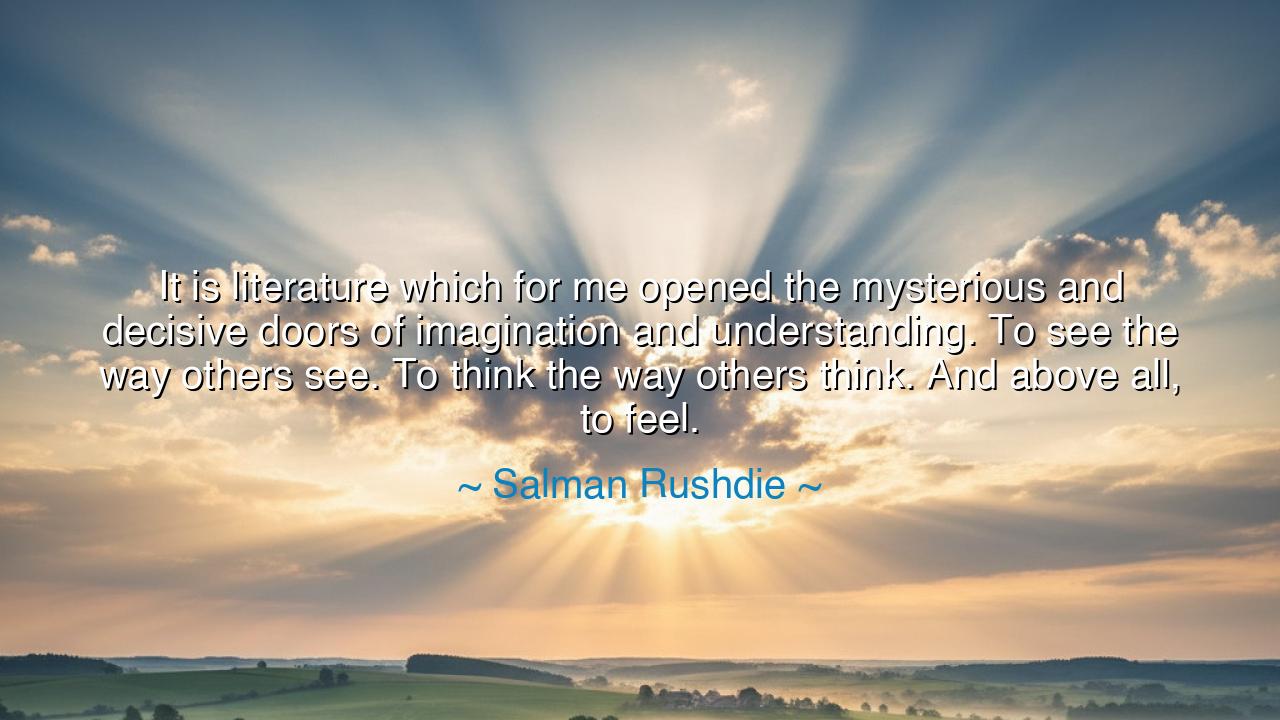
It is literature which for me opened the mysterious and decisive
It is literature which for me opened the mysterious and decisive doors of imagination and understanding. To see the way others see. To think the way others think. And above all, to feel.






“It is literature which for me opened the mysterious and decisive doors of imagination and understanding. To see the way others see. To think the way others think. And above all, to feel,” wrote Salman Rushdie, the novelist whose words have traversed continents and courted both wonder and controversy. In this profound reflection, Rushdie speaks not only as a writer, but as one transformed by the written word. He reveals that literature is not mere ornament — it is the bridge between souls, the sacred key that unlocks both imagination and empathy, allowing one human being to perceive the vastness of another’s inner world.
Rushdie’s life and art were shaped by a confluence of worlds — the East and the West, faith and reason, myth and history. For him, literature was a portal between them all. It was through stories, both ancient and modern, that he discovered the power to see as others see, to think as others think, and, most importantly, to feel as others feel. In this, he echoes the timeless wisdom of the ancients: that art, at its highest form, teaches compassion. It trains the heart to look beyond itself. The writer becomes a vessel for many lives, and the reader — through imagination — becomes a witness to all humanity.
When Rushdie speaks of “the mysterious and decisive doors,” he gestures toward the almost mystical experience of reading — how a simple arrangement of words can transport the soul beyond time, culture, and circumstance. Literature is the great equalizer of the spirit. Through it, kings and beggars, saints and sinners, men and women of every age, all meet in the same intimate space — the mind of the reader. When we read Tolstoy, we are Russian for a while. When we read Toni Morrison, we walk through the haunting echoes of America’s past. When we read Homer, we sail with Odysseus across the wine-dark sea. The imagination, guided by the written word, becomes the chariot by which we transcend our narrow selves.
There is a historical echo to this truth. The philosopher Aristotle called literature “a representation of life,” yet also insisted it was more true than history, for it reveals not merely what happened, but what might happen — the universal patterns of human thought and emotion. And the mystic Rumi wrote that the poet’s task is to “break open the heart,” to let love flow where logic fails. So too, Rushdie speaks from that lineage: of literature as revelation — as the divine art that makes the invisible visible. It is imagination that gives sight to the blind intellect, understanding that gives wisdom to the heart.
In Rushdie’s own novels, this philosophy takes flesh. In Midnight’s Children, the story of India’s birth is told through magic and metaphor — history filtered through the imagination, made human by laughter, sorrow, and myth. It is through this blending of truth and invention that Rushdie reveals what no record of dates or battles could: the feeling of a nation being born. To “see the way others see,” he teaches, is to look with the heart’s eye, not the mind’s alone. Literature is not about information, but transformation. It changes the reader as surely as it changed the writer.
But Rushdie also speaks to something deeper — to the moral necessity of empathy in a divided world. To “think as others think” does not mean to surrender your beliefs, but to understand that every soul lives within its own story. Through literature, we learn that all lives are equally real. We come to recognize, as he says, “above all, to feel” — to let the boundaries between self and other dissolve. In that act of feeling, imagination becomes a moral force. It is through such understanding that cruelty weakens and compassion grows.
Let this, then, be the teaching: read not only with your eyes, but with your heart. Seek the worlds hidden in words. Let literature be your guide, for in its pages lie the reflections of all humanity. Every book you open is a door — mysterious and decisive — into the consciousness of another. Step through those doors humbly, and you will find that your own imagination expands, your understanding deepens, and your capacity to feel becomes boundless.
And remember, as Salman Rushdie reminds us: imagination is not an escape from life, but an entrance into it. To read, to write, to dream — these are not luxuries but the essence of what makes us human. Through literature, we learn not only to see the world anew, but to love it more deeply, in all its pain and beauty. For the one who has truly read with imagination has already begun to live with compassion.






AAdministratorAdministrator
Welcome, honored guests. Please leave a comment, we will respond soon